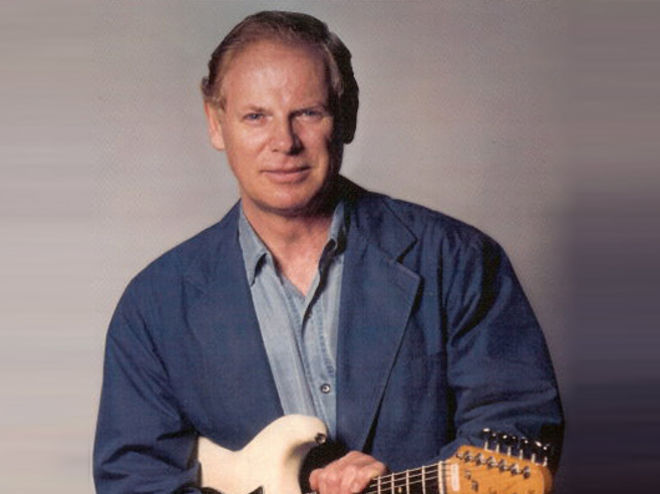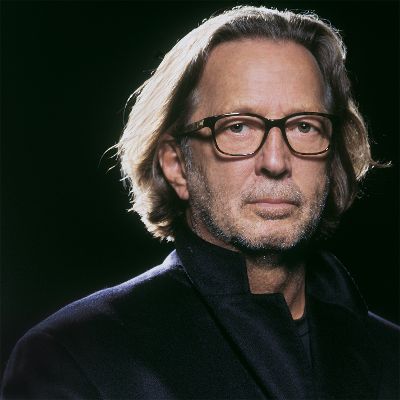
Vic Flick is a music industry legend. He has composed, conducted and performed alongside many of the biggest names in show business. He took time recently for an in-depth interview for the fans at 007Forever…
Matt Sherman: Thanks, Vic, for agreeing to an interview with us at 007 Forever. Please tell us a bit about your early career. What motivated you to play guitar music? Why that choice of instrument?
Vic: When I was about 12 years old, my father started a small dance band with a neighbor. I was studying piano at the time but as my father played piano, that was me out of the picture. A friend bought me a Gibson guitar, which I practiced on like crazy, joining the band a year later. I could have been given a trumpet or a flute but guitar was it and that was what I finished up with, playing for the rest of my life in varying degrees of intensity.
Matt: Your debut as composer was for the famous “Viva Zapata!” in 1952. [Note to 007 Forever readers: Joseph Wiseman of “Dr. No” fame helps headline the picture.] Tell us about doing that project as a young performer. Zapata must have made an interesting genre for a young composer helping to build a film score.
Vic: “Zapata” was a title included on an album by John Barry called “Stringbeat”. John was stuck for an extra title and asked me to compose one. A last minute demand–but what you hear has proved to be very popular.
Matt: You`ve played on hit tunes and conducted and recorded alongside some of music`s biggest greats, including–and this must be some kind of incredible statistic–Bond music stars Tom Jones, Lulu, Shirley Bassey, Matt Munro, Burt Bacharach, Nancy Sinatra, John Barry, and more! What standout memories remind you of your British studio recording days?
Vic: The very early 60`s were wonderful times to be in the music business. The “Pop Record” phenomenon was just taking off and everybody was happy to be on board. Singers like Tom Jones, Lulu, etc., were more friends than “stars”–if you know what I mean. I used to see and work with them regularly in recording, broadcast and television studios. More often than not when they were promoting their record that I`d worked on. I remember Burt Bacharach as being a perfectionist in his arrangements and production–as well as being a great guy to work with. I hadn`t seen Burt for what must have been four years when I met him again at a recording studio`s entrance. Without hesitation he said, “Good to see you again, Vic.” Quite a memory.
Shirley Bassey is one tremendous artist and always a joy to work with. Matt Monro was one of the nicest people you could wish to meet. He always made a point of talking and meeting with the musicians in the orchestra. Same with Bing Crosby. I was working on a television show with him and he actually apologized to the band for wanting to rehearse his number again. Not like some I could mention!
Matt: The James Bond legacy has brought enormous popularity and exposure to everyone associated with Agent 007. As lead guitar and an innovator on the project, what was your reaction, and that of your colleagues on the Barry Seven, at the runaway success of the original Bond theme in the early 60`s and beyond?
Vic: In the beginning there wasn`t much to react to. It was another film session that we were perhaps more associated with than many others. I was pleased to be so intimately involved yet it was probably 20 years later that I began to realize how significant the Bond series of films were and really, only in the past 7 to 10 years, has the amazing popularity of the films made an impact on me.
Matt: Most fans know that the original Bond theme was a rush job for John Barry handed down from the producers of “Dr. No”…Was it a very good feeling in the studio right after the track was laid down with the Barry Seven? Did you foresee any of the amazing popularity of the song?
Vic: I can remember there being an atmosphere of excitement about the recording because, in a way, it was very different to the majority of film themes–especially spy films. There was no film shown at the time of the recording so we could only imagine what the content of the film was! When I saw “Dr. No” and heard how much the theme had been used throughout I thought how good it sounded–and how effective was John Barry`s treatment.
Matt: You worked on six of the first John Barry-scored EON Bond films. Does one production or studio session on the Bonds stand alone as a favorite?
Vic: “Goldfinger” and “Diamonds Are Forever” have always been my favorites. They seem to epitomize the Bond “thing”. Shirley Bassey`s recordings of the themes were winners and they were the first Bond films I felt completely involved with.
Matt: You were invited to update and re-record the original Bond Theme with Eric Clapton for License To Kill. Please tell us about those sessions!
Vic: It wasn`t an update. Eric and Michael had composed a new theme and had asked me to come in and think up some low guitar riffs reminiscent of the original theme. We had a great day together in the studio and the following day we shot the video in a loft overlooking the Thames. The sound recording and the video disappeared after EON Productions turned it down as not being commercial enough. As we all know, Gladys Knight got the job.
Matt: 007Forever fans have been eagerly following Jeffrey Bunzendahl`s spy spoof, “Wilson Chance,” due out in spring 2001 and headed for wide release in video stores, for which you are graciously helping Bunzendahl`s “Steel Shavings” production team in scoring the final film. It sounds like a fun collaboration…
Vic: It is a fun collaboration. Jeffrey and George Bunzendahl and the rest of the team are so full of enthusiasm and technical know how that it`s a pleasure to be associated with them. They are a young team who are managing to do some great work without the financial backing that, say, Dreamworks has. Most important, Jeffrey has promised me two seats for the premiere.
Matt: Bond and genre music fans were abuzz when you recorded key tracks from the EON films for “Bond: Back In Action,” a recent release bringing you to reprise some of your work. Was the success of that project the motivation behind your creating “James Bond NOW” for the fans? Why revisit the Bond genre at this time?
Vic: In a round about way, yes. A colleague, Les Hurdle, and myself had worked on the “James Bond Theme” and “Goldfinger” some six years ago as part of a “James Bond” project–kind of samples to see if anybody was interested. Even back then the treatment was very little different from what you hear on “James Bond NOW”. Silva Screen Records asked me to do the signature track and some other guitar work on their CD at the same time informing me of the upsurge of interest in Bond music. I presented Silva Screen with the two titles but they weren`t interested saying it wasn`t as the original score–something they specialize in. When I heard the David Arnold music track to the recent Bond film, “The World Is Not Enough,” I realized we were ahead of the time and decided to go ahead with the “James Bond NOW” project as an independent production. I`m glad I made that decision, as the reception to the CD has been wonderful.
Matt: Your new compositions on James Bond NOW like “Copacabinsky” (adding to your re-worked Bond covers) are quite interesting. Tell us about them. What kinds of things ran through your mind in the studio sessions and beforehand on this special project?
Vic: I wanted some original input on the project and decided that a composition, “Shaken Not Stirred” with the excitement of the Bond Theme, a romantic composition, “Silken Cover,” and a third composition mixing the coldness of Russia with the exoticness of Latin music would do very nicely.
Matt: What would be your response if composer David Arnold or another Bond conductor invited you to play for the twentieth Bond film due out in 2002? Would you be willing to revisit the theme for a 40th Anniversary special?
Vic: What a great idea Matt and something I would be thrilled to do. If it happens I`ll make sure you`re in the studio when it`s recorded.
Matt: Indulge in a little wish fulfillment for 007Forever`s readers if you will. Imagine you can pick up the phone and plan a fantasy collaboration with any musician of any era, past or present, from Beethoven to Billy Idol. Who would you choose to work alongside? And how do you feel about current trends in today`s pop and rock music? Are there any bands or soloists today you avidly follow?
Vic: Some question! I`d like to have another try with Eric Clapton and Michael Kamen. Hendrix playing a solo on one of my compositions would be a high for me–as would collaboration with my session colleagues “Big Jim” Sullivan, Jimmy Page and Chris Spedding. There are so many excellent and varied groups out there that it is impossible to choose. If Mariah Carey would like to sing a vocal that would be the frosting on the cake.
Matt: What do you want people to remember about the life and times of Mr. Vic Flick?
Vic: Musically, I am pleased to have been a part of so many people`s lives. I also hope that if I returned to all the places I`ve been, I`d be greeted with a smile.
–Vic Flick and his delightful spouse, Judy, live in Santa Monica,
California and Vic`s work is featured at www.vicflick.com. Music samples from all ten tracks of his latest work, “James Bond NOW,” are available to listen to online in different audio formats at www.blizzardrecords.com.
Geoff Leonard, co-author of “John Barry: A Life In Music” recently reviewed Vic Flick`s “James Bond NOW”. Some of his comments: “From the mid-sixties onwards there have been many cover versions of James Bond film themes available to an apparently insatiable record-buying public. Some have been very good, even excellent, but some have been very poor–horrendous in one or two cases. So it`s a great pleasure to be able to review a new one, and one by the man who played guitar on the original James Bond Theme, and on many other Bond film scores–Vic Flick. For “James Bond NOW,” Flick has taken seven of his own favorite Bond themes, given them his own highly original treatment, and added three of his own compositions as a bonus…”Goldfinger” and “The James Bond Theme” have received sparkling makeovers. The famed guitar sound is still prominent, but a backing track years away from the sixties birthplace of these themes has been utilized to surprisingly good effect…” Welcome back, Vic!

